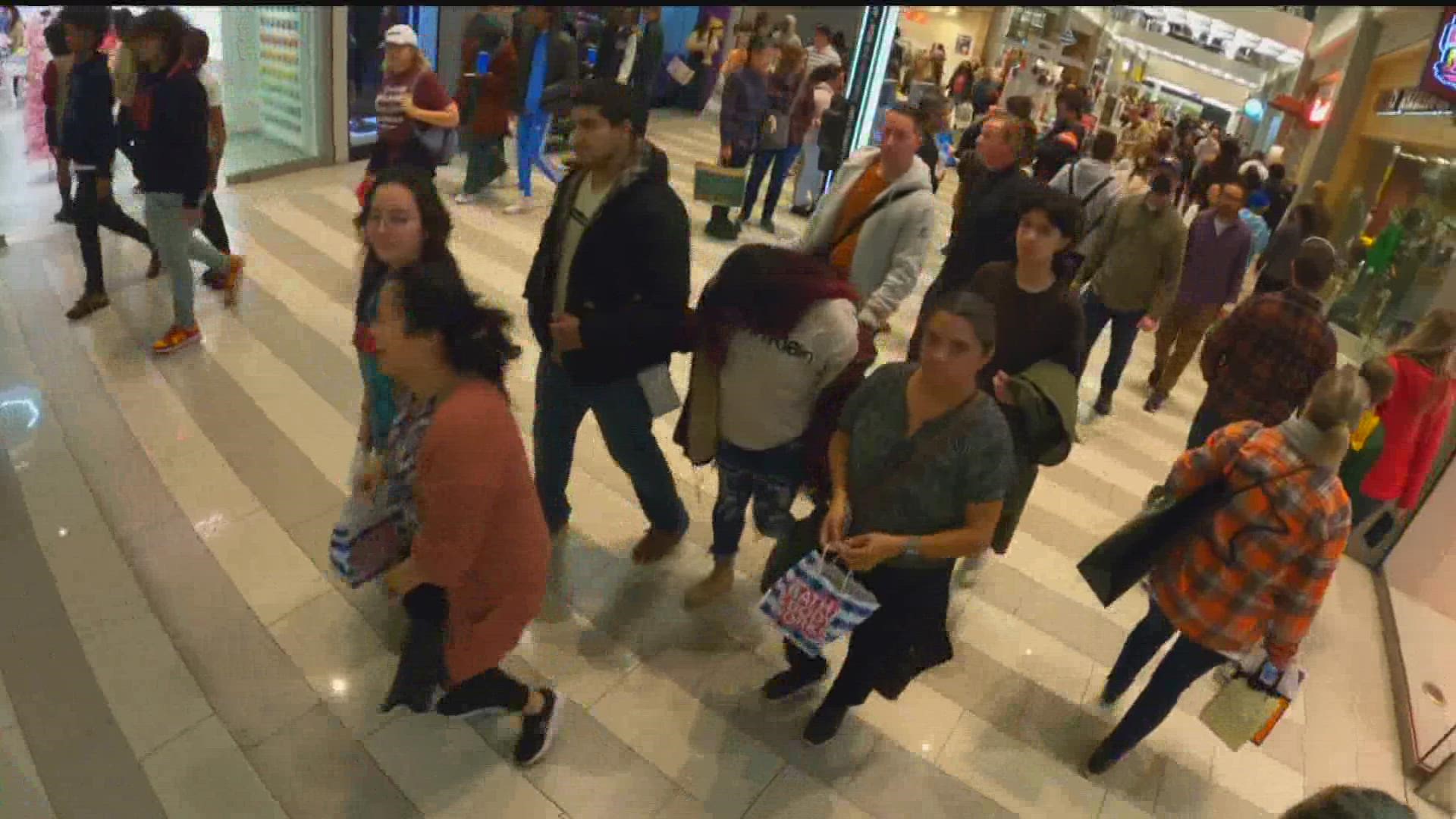BLOOMINGTON, Minn. — Black Friday marks a return to familiar holiday shopping patterns across the country, including the Mall of America, where shoppers were lined up outside ahead of the mall's scheduled 7 a.m. opening.
"We are trying to beat the rush, enjoy some of the deals, spend time as a family. So we ate turkey dinner early... and then we're here," said one shopper, who waited in line for nearly 12 hours for MOA's opening.
According to Laura Utecht, the mall's director of communications, the crowd on Friday surpassed 2021 levels and is expected to surpass 2019 pre-pandemic levels.
“Honestly, I've never seen a mall any busier than this,” said shopper Anita Irakoze. “So, this is actually kind of shocking.”
Irakoze remembers the days when she and her friends would wake up early to get to the deals quickly. Now, there’s less pressure to do so.
“I remember when I was a little kid, it was more of a big deal,” she said. “But now it's more like, never mind. I'll just do it online.”
Jescah Kahungu went with Irakoze, but she said in past years she would stay home.
"I think I'm coming more so for the social interactions not so much for like the actual deals and stuff because I can find a lot of those online,” she said.
But no matter the crowd, the Mall of America still attracts die-hard Black Friday shoppers.
Veronica Sazama and her family came from Wisconsin.
“The kids have been looking forward to coming in here,” she said. “They want to hit up the aquarium in the amusement park.”
Sazama said there’s a certain charm about the busy day.
“It’s kind of chaotic, crazy, but also fun,” she said. “It's kind of an adventure.”
The Mall of America said it has beefed up security for the big day.
"We call Black Friday our 'Super Bowl' for people here at Mall of America," said Utecht. "A lot of prep goes into it, but we're lucky to have incredible teams here to get everything ready so these lines of people can get through the door and have an incredible experience and really get back in those holiday traditions we had pre-COVID, get back into normalcy."
However, inflation is also weighing on consumers this Black Friday.
Elevated prices for food, rent, gasoline and other household costs have taken a toll on shoppers. As a result, many are reluctant to spend unless there is a big sale and are being more selective with what they will buy — in many cases, trading down to cheaper stuff and less expensive stores.
Shoppers are also dipping more into their savings, turning increasingly to “buy now, pay later” services like Afterpay that allow users to pay for items in installments, as well as running up their credit cards at a time when the Federal Reserve is hiking rates to cool the U.S. economy.
Such financial hardships could help drive shoppers to look for bargains.
Isela Dalencia, who was shopping for household essentials like detergent at a Walmart in Secaucus, New Jersey, earlier this week, said she's delaying buying holiday gifts until Cyber Monday — the Monday after Thanksgiving — when online sales rev up. Then, she will wait again until the week before Christmas to get the best deals, unlike last year when she started buying before Black Friday.
“I am shopping less,” Dalencia said, noting she will spend about $700 for holiday gifts this year, one-third less than last year.
Katie Leach, a social worker in Manhattan, was also browsing the aisles at Walmart but said she will start holiday shopping during the first week of December as usual. This time, however, she'll be relying more on bargains, her credit card and “buy now, pay later” services to get her through the shopping season because of surging prices on food and other household expenses.
“The money is not going as far as last year," Leach said.
This year's trends are a contrast from a year ago when consumers were buying early out of fear of not getting what they needed amid clogs in the supply network. Stores didn't have to discount much because they were struggling to bring in items.
But some pandemic habits are sticking around. Many retailers that closed stores on Thanksgiving Day and instead pushed discounts on their websites to thin out crowds at stores are still holding onto those strategies, despite a return to normalcy.
Major retailers including Walmart and Target again closed their stores on Thanksgiving. And many moved away from doorbusters, the deeply marked down items offered for a limited time that drew crowds. Instead, the discounted items are available throughout the month, on Black Friday or the holiday weekend.
Against today's economic backdrop, the National Retail Federation — the largest retail trade group — expects holiday sales growth will slow to a range of 6% to 8%, from the blistering 13.5% growth of a year ago. However, these figures, which include online spending, aren't adjusted for inflation so real spending could even be down from a year ago.
Adobe Analytics expects online sales to be up 2.5% from Nov. 1 through Dec. 31, a slowdown from last year's 8.6% pace when shoppers were uncertain about returning to physical stores.
Analysts consider the five-day Black Friday weekend, which includes Cyber Monday, a key barometer of shoppers' willingness to spend, particularly this year. The two-month period between Thanksgiving and Christmas represents about 20% of the retail industry’s annual sales.
Watch more KARE11 Sunrise:
Watch the latest coverage from the KARE11 Sunrise in our YouTube playlist:

